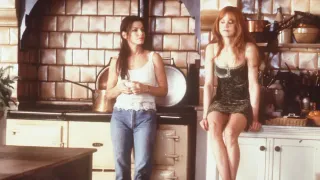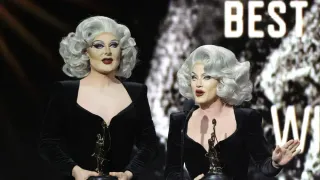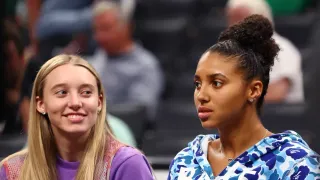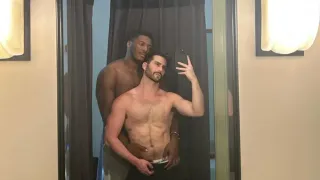
May 13
EDGE Interview: Benito Skinner Goes from the Tiny Screen to the Small Screen with New Series 'Overcompensating'
Timothy Rawles READ TIME: 5 MIN.
Social media star Benito Skinner is leaving the tiny screen and heading to something not much bigger than a laptop monitor, but much larger than your iPhone. His semi-autobiographical series "Overcompensating" is about to hit Amazon Prime Video on May 15, and it should be watched on a television.
Whatever size screen you watch it on, you're going to get Skinner playing a closeted college student immersed not only in his personal drama, but caught up in the dramas around him. It's a fresh take on any Amy Heckerling romp where young adults are coming of age and learning important lessons through sex, drugs, and bodily fluids.
Skinner talked to EDGE ahead of the show's premiere. He picked up the call with such enthusiasm it quickly became apparent this series is the most important piece of entertainment he's ever done.
And why not? He's not only writing the episodes, he's also co-producing them. For years, he's been in the social media algorithm of making people laugh as various campy characters for a minute or two; "Overcompensating" is an eight-episode series, each clocking in at about 40 minutes, that follows a closeted former high school football player as he navigates college life.
But Benito, as he likes to be called, isn't flinching; he's going head-on into this milestone, absorbing the suspense before the show hits Amazon Prime Video.
"I just went with the cast to Times Square and saw the billboard," he says. "And I'm like, 'I think I will process this when I'm 50.' I literally left Caroline's on Broadway with a check for my first show, and, finally, I can pay rent for two months. I was in Time Square eight years ago, or maybe seven years ago, and so being there [now], I was like, 'What is going on?'"
Like the character in his show – also named Ben – he is processing a turning point in his life that is sort of like coming out again, but this time to the world. To that, add a few of autobiographical plot points, and you understand why he's nervous.
"Oh, God! It's so hard to know, like, exactly how much," Skinner exclaims. "But I think I was inspired by relationships and feelings – mainly, this relationship I had with a woman in college who, I think, was the first person I stopped, maybe, overcompensating in front of."
The main conflict in the show is Ben coming to terms with his sexuality. His hard-nosed heteronormative dad and super-straight fraternity brothers are forces to be reckoned with, leaving Ben in a sort of limbo, stunting any epiphanies.
Benito says the show may have truths of his life blended in, but it's really about everything that pertains to being in the closet or the queer experience. The last episode ends unresolved, and a second season has yet to be announced.
"I grew up on, you know, 'Gossip Girl' and 'The OC,' so it's like you can't end anything without a cliffhanger. What's the point? You have to make some good fucking TV."
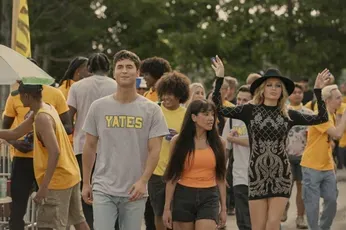
Source: Courtesy of Amazon Prime Video
Part of Benito's appeal is his striking good looks. For "Overcompensating," he needed to look like a college freshman. At 31, Benito naturally passes for a first-year student; what's more, he's toned up his body, and might be the world's first perpetual twink. It's a blessing, because he's been working on this project for years.
"I fortunately had a long time to develop this," he explains. "We took our time, and I was able to make 50 Pinterest boards of what I thought the makeup and the clothes and everything should look like, and playlists."
He already knew what he would write for the final two lines of the show. Thinking that far ahead helped him, and the writer's room, fill in the rest. He learned this creative process from doing short-form content. He would write the sketches on Sunday, film on Monday, edit on Tuesday and Wednesday, then finally post on Thursday – alone.
He says he learned how to be patient doing it that way, therefore never really feeling fearful about making "Overcompensating."
"I think I just felt excited at each point, because it just felt like the thing kept being more and more real, and I could process it and take my time and think about what I really wanted to say, who these characters were gonna be. It's such a mix of imposter syndrome and, at times, feeling really confident."
That moxie pertains to the technical stuff. But when asked about having to act out things he'd already experienced in real life, Benito pauses before answering. He then says making the show was a healing journey; his real experience many years ago was poisoned by self-loathing. He had judged himself to the point of unclarity.
"I [spent] eight years thinking, 'Why didn't I come out sooner?' Like, I've missed so much of my life. And then, I think in shooting ['Overcompensating'] I finally forgave myself, and saw humanity and everyone around me." He's says everyone hides behind something, "and it's not just queer people; we're not the only ones with a secret or something."
This awakening is a blessing for those who realize it. Skinner acknowledges that his experience wasn't unique, although it felt like it was at the time. Young adults often think their problems are one-of-a-kind, when in reality they are rites of passage.
"Many queer people before me and after me had my reasons, and I did not feel comfortable, so I didn't come out, and I think I finally could forgive myself," he says in a soft but serious tone. "But I think in shooting the fifth episode, what you're seeing on screen is a real experience where I put my love in the wrong space. And I just really wanted to finally be loved, and the excitement in thinking, 'Maybe I can come out. But it'd be nice if I could come out with someone else.' And then I could say, 'Maybe it was just this one person, because I'm not really gay. It's just this one person.' And so, what you're seeing in that scene is absolutely this experience that I think devastated me, but changed my life. You know?"
Falling in love with a man and accepting it was the last part of accepting his true self. Skinner says that a platonic girlfriend helped him through his inner struggle and, just like in real life, the show includes this aspect in the form of Carmen, played exquisitely by actress Wally Baram.
No one knows anything in Hollywood when you ask about a project, yet they know everything. It's just how the machine operates. So, when I asked Skinner about a possible Season Two, he was optimistic.
"I know nothing. So, I'm hoping it finds its people. I feel so proud of it. I'm ready to go if we do get a Season Two. I've got some fun things up my sleeve."
From reel streams to real dreams, Skinner is ready to play among the big boys, and he's had years of practice. It won't be long now before this handsome young man is booking larger roles and eating at craft service tables instead of brown bagging it.
"I'm ready," he says with that signature Skinner grin. "I've been auditioning for gay assistant roles. I think that's where I've been the last 10 years, and I would love to play one. But I'm like, 'We're known to run companies, too, you guys.'"

